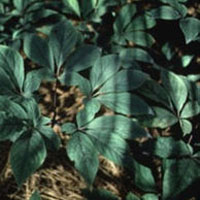Asian Ginseng
 © Steven Foster
© Steven FosterHow It Works
Ginseng’s actions in the body are thought to be due to a complex interplay of constituents. The primary group are the ginsenosides, which are believed to counter the effects of stress and enhance intellectual and physical performance. Thirteen ginsenosides have been identified in Asian ginseng. Two of them, ginsenosides Rg1 and Rb1, have been closely studied.1 Other constituents include the panaxans, which may help lower blood sugar, and the polysaccharides (complex sugar molecules), which are thought to support immune function.2, 3
Long-term intake of Asian ginseng may be linked to a reduced risk of some forms of cancer.4, 5 A double-blind trial found that 200 mg of Asian ginseng per day improved blood sugar levels in people with type 2 (non-insulin-dependent) diabetes.6 Human trials have mostly failed to confirm the purported benefit of Asian ginseng for the enhancement of athletic performance.7, 8 One preliminary trial suggests it may help those in poor physical condition to tolerate exercise better.9 In combination with some vitamins and minerals, 80 mg of ginseng per day was found to effectively reduce fatigue in a double-blind trial.10 Another double-blind trial also found it helpful for relief of fatigue and, possibly, stress.11 Although there are no human clinical trials, adaptogenic herbs such as Asian ginseng may be useful for people with chronic fatigue syndrome. This may be because these herbs are thought to have an immuno-modulating effect and also help support the normal function of the hypothalamic-pituitary-adrenal axis, the hormonal stress system of the body.12
Asian ginseng may also prove useful for male infertility. A double-blind trial with a large group of infertile men found that 4 grams of Asian ginseng per day for three months led to an improvement in sperm count and sperm motility.13
Asian ginseng may also help men with erectile dysfunction. A double-blind trial in Korea found that 1,800 mg per day of Asian ginseng extract for three months helped improve libido and the ability to maintain an erection in men with erectile dysfunction.14 This finding was confirmed in another double-blind study, in which 900 mg three times a day was given for eight weeks.15
How to Use It
The most researched form of ginseng, standardized herbal extracts, supply approximately 5–7% ginsenosides.16 Ginseng root extracts are sometimes recommended at 200–500 mg per day. Non-standardized extracts require a higher intake, generally 1–4 grams per day for tablets or 2–3 ml for dried root tincture three times per day. Ginseng is traditionally used for two to three weeks continuously, followed by a one- to two-week “rest” period before resuming.
Copyright © 2026 TraceGains, Inc. All rights reserved.
Learn more about TraceGains, the company.
The information presented by TraceGains is for informational purposes only. It is based on scientific studies (human, animal, or in vitro), clinical experience, or traditional usage as cited in each article. The results reported may not necessarily occur in all individuals. Self-treatment is not recommended for life-threatening conditions that require medical treatment under a doctor's care. For many of the conditions discussed, treatment with prescription or over the counter medication is also available. Consult your doctor, practitioner, and/or pharmacist for any health problem and before using any supplements or before making any changes in prescribed medications. Information expires December 2026.













